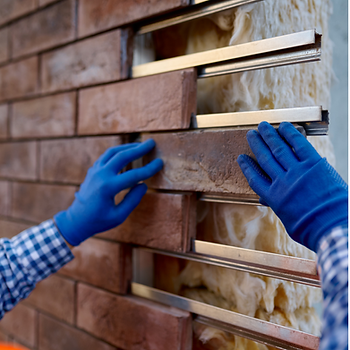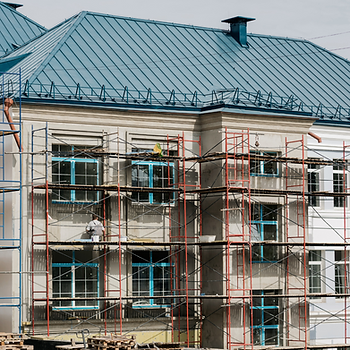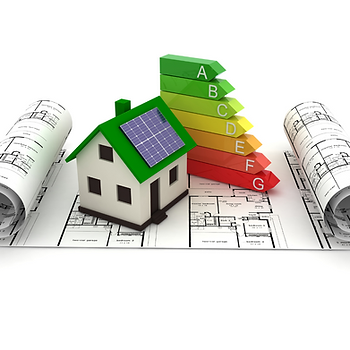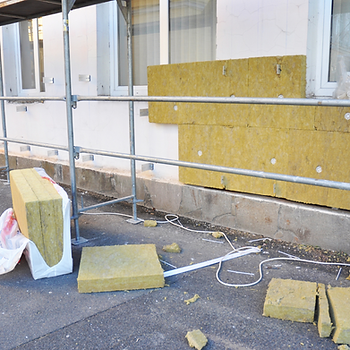Did you know that 3 out of 5 UK homes have a low energy efficiency rating and that external wall insulation grants could help to address the balance?
If your home was built before 1920 it is likely that your property has solid walls – either solid brick or solid stone. Most buildings built after 1920 are of cavity wall construction). If your house has solid walls then it may benefit from having external insulation installed, which can help to substantially reduce heat loss and also to help prevent dampness from penetrating through the walls.
In this article, we’ll explore everything you need to know about external wall insulation, or EWI for short, the difference it can make to your comfort and energy costs, and how to get this effective energy improvement for free.
Why is External Wall Insulation Important For UK Homes?
External Wall Insulation (EWI) is a highly effective solution for homeowners in the UK seeking to enhance the comfort, energy efficiency, and overall quality of their homes.
From providing year-round comfort to contributing to cost savings and environmental sustainability, EWI is a wise investment that goes well beyond its initial installation.

External wall insulation grants are available throughout England, Scotland and Wales to help homeowners make their homes more efficient and bring down energy costs.
If you receive benefits or your home has a low energy performance rating, you may automatically qualify for free improvements.
How Does External Wall Insulation Work?
External Wall Insulation (EWI) is a construction technique used to improve the thermal performance and energy efficiency of buildings while enhancing their appearance.
Here’s how EWI works:
Preparation: The first step is to prepare the external walls of the building. This typically involves cleaning the walls and repairing any existing damage, such as cracks or gaps.
Insulation Layer: A layer of insulation material is then applied directly to the external walls. This insulation layer can vary in thickness depending on the desired level of thermal performance. Common insulation materials include expanded polystyrene (EPS) and mineral wool.
Mechanical Fixings: The insulation layer is securely attached to the walls using mechanical fixings, such as plastic dowels or adhesives. These fixings ensure that the insulation remains in place and does not detach from the walls.
Reinforcement: A layer of reinforcement mesh is applied over the insulation. This mesh provides additional strength and stability to the system.
Base Coat: A base coat of render, often made of cement or polymer-modified materials, is applied to the reinforcement mesh. This base coat serves as a protective layer and helps to create a smooth and even surface.
Top Coat: Finally, a top coat of render is applied over the base coat. This top coat can be customized in terms of colour and finish, allowing for a wide range of aesthetic options. It also provides weather resistance and durability.
The EWI system effectively wraps the building in a thermally insulating layer, preventing heat loss through the walls and reducing the need for heating or cooling.
It also helps to protect the building from weather damage and can enhance its appearance. EWI is a proven method for increasing energy efficiency and thermal comfort in both residential and commercial buildings.
The Many Benefits of External Wall Insulation For UK Homeowners
External Wall Insulation (EWI) offers a range of benefits for UK homes. Here are some of the key advantages:
Improved Energy Efficiency
EWI significantly enhances the thermal performance of a building by reducing heat loss through external walls. This results in lower heating and cooling costs, making it an effective way to save on energy bills.
Enhanced Thermal Comfort
With EWI, buildings maintain more stable and comfortable indoor temperatures throughout the year. Cold spots and drafts are minimized, creating a more pleasant living or working environment.
Reduced Carbon Emissions
By decreasing the energy required for heating and cooling, EWI helps reduce the carbon footprint of a building. It aligns with sustainability goals and contributes to a greener, more eco-friendly construction approach.
Increased Property Value
EWI can add value to a property by improving its energy efficiency and aesthetic appeal. It can make a building more attractive to potential buyers or tenants, potentially leading to higher resale or rental prices.
Enhanced Building Appearance
EWI offers a range of customizable finishes and colours, allowing for architectural creativity. It can transform the appearance of older or deteriorating buildings, giving them a fresh, modern look.
Protection against Weathering
EWI acts as a protective layer for external walls, shielding them from weather-related damage such as rain, wind, and UV radiation. This helps prolong the lifespan of the building’s structure.
Condensation Control
By improving the thermal performance of walls, EWI helps prevent condensation buildup, which can lead to dampness and mould issues.
Sound Insulation
Depending on the chosen insulation materials, EWI can also provide improved sound insulation, reducing noise pollution from outside.
Minimal Disruption
EWI is typically installed externally, minimiing disruption to building occupants during the installation process. Interior spaces remain largely unaffected.

Compliance with Building Regulations
EWI systems often help buildings meet or exceed energy efficiency standards and building regulations, ensuring compliance with local codes.
Overall, EWI is a cost-effective and sustainable solution for improving the energy performance, comfort, and aesthetics of buildings while contributing to environmental and economic benefits.
The Power of Government Energy Efficiency Incentives
The average cost of external wall insulation ranges from £8000 for a small, mid–terrace property, to over £20,000 for a detached property.
External wall insulation grants are making this particular home improvement more accessible throughout the UK.
The UK government is committed to bolstering energy efficiency efforts and has introduced a range of grants and initiatives to support this commitment.
The significance of these incentives becomes apparent when considering the following:
Funding Help: Government grants serve as a financial lifeline for homeowners, easing the financial burden associated with external wall insulation projects. This financial support broadens access to energy-efficient upgrades, making them a viable option for a wider spectrum of homeowners.
Economical Energy Use: By embracing external wall insulation, homeowners can reduce heat loss through their walls, leading to a substantial reduction in energy consumption. The outcome? Lower monthly energy bills, enabling homeowners to accrue long-term savings and enjoy improved economic stability.
Eco-Conscious Impact: External wall insulation is a proactive step towards energy efficiency that reduces the need for excess heating or cooling. This, in turn, diminishes energy demand and mitigates harmful emissions. Government incentives empower homeowners to play a pivotal role in environmental sustainability by decreasing their carbon footprint.
Property Enhancement: The adoption of energy-efficient upgrades like external wall insulation can elevate a property’s energy efficiency rating and overall desirability. This can potentially amplify property value, rendering homes more appealing to prospective buyers or renters.
Government incentives are instrumental in promoting external wall insulation, making homes not only more comfortable and cost-effective but also contributing to a sustainable and eco-friendly future.
What Grants Are Available For External Wall Insulation?
When it comes to government grants for insulating the outer walls of your home, you’ve got a range of choices to explore. For this particular article, we’re going to focus on the Energy Company Obligation (ECO) Scheme. It’s a scheme run by OFGEM and backed by the UK government.
The ECO scheme is all about making homes in the UK more energy-efficient, especially those that need it most, like homes with low incomes or vulnerable residents. The big energy companies have to help make these homes more energy-efficient which is good news for those living in cold and inefficient homes.
The latest part of the scheme is called ECO4 and its main goal is to cut down on carbon emissions and help people who struggle with high heating bills. It’s like a makeover for your home, making it warmer and cheaper to run.
Here’s what you need to know about ECO4:
The main aim is to make homes more energy-efficient and help people save on energy bills.
ECO4 is mostly for homes that don’t use gas for heating, relying on things like Oil, LPG, electric boilers, or solid fuels instead.
If your home’s Energy Performance Certificate (EPC) rating is D or higher, ECO4 funding might not be for you. But if your rating is lower, like E or below, you may qualify for a grant. The improvements from ECO4 should boost your EPC rating to at least a D.
Homeowners and private tenants who meet certain criteria could get a grant to cover the cost of external wall insulation or other energy-saving upgrades.
If you qualify, you might get some big financial help, even covering the whole cost of the insulation.
To get started, you will need to complete an application form with details about your property. They will check if you’re eligible and will arrange a free survey of your property to determine which energy-saving measures are most suitable.
Do I Qualify For a Government Grant For External Wall Insulation?
Many residents in the UK have the opportunity to obtain free external wall insulation through the Energy Company Obligation (ECO4) scheme. You might be eligible for a full grant covering the installation costs if you meet these criteria:
Health Conditions: If someone in your home has a long-term health condition like asthma, diabetes, arthritis, or limited mobility, and they’re on medication, you’ll need a letter from a GP to confirm this.

Low Income: If the total income for your household is less than £31,000 per year (for the self-employed, this refers to profit, not turnover).
Receiving Benefits: If anyone living in your home receives the following benefits, you could be eligible for external wall insulation grants:
- Working Tax Credit
- Child Tax Credit
- Universal Credit
- Housing Benefit
- Pension Credit
- Income Support
- Income-Related Employment & Support Allowance
- Income-Based Job Seekers Allowance
- Child Benefits (depending on the total income of your household).
The ECO Scheme is a fantastic opportunity for homeowners, especially those with lower incomes, to upgrade their homes for better energy efficiency and a smaller carbon footprint.
By offering financial support for things like insulation, this scheme helps the UK move closer to cleaner and more sustainable energy usage while tackling issues like fuel poverty.
Can I Get an External Wall Insulation Grant If I Don’t Receive Benefits?
The good news is that you could be eligible for external wall insulation grants even if you don’t currently receive the benefits listed above. LA Flex is an extension of the ECO4 scheme that allows local authorities to assist households that fall into certain categories. You will need to check if your council area offers LA Flex. You may be eligible for external wall insulation grants if you meet the following criteria:
- The household’s low-income status and susceptibility to fuel poverty.
- Property characteristics, such as challenges in heating due to inadequate insulation or the absence of a central heating system.
- Vulnerable occupants, encompassing the elderly, persons with disabilities, or families with young children.
How to Apply For External Wall Insulation Grants?
The Energy Company Obligation (ECO) scheme, specifically ECO4, follows a fairly straightforward application procedure. Here’s a general outline of how the ECO4 application process usually unfolds works for external wall insulation:
Eligibility Assessment: The initial step entails filling out an eligibility assessment form to ascertain whether you meet the criteria for ECO4. Eligibility predominantly hinges on factors related to your home’s energy performance rather than government benefits.

Submission of Application: Next, you’ll need to complete the application forms provided, either by yourself or with the assistance of a designated company. These forms typically require details about your residence, energy consumption, and eligibility based on the merits of your home’s energy performance.
Evaluation and Approval: Following the submission of your application, it undergoes a comprehensive review to ensure it meets ECO4 criteria. An essential component of this process is a complimentary assessment of your home’s energy efficiency, identifying the most beneficial improvement measures, such as external wall insulation.
Implementation of Energy Efficiency Measures: Upon approval, your energy supplier will coordinate the installation of the chosen energy efficiency measures, in this case, external wall insulation. Importantly, you won’t bear the upfront expenses for these enhancements if you meet the stipulated criteria.
Validation and Inspection: Following the installation of energy efficiency measures, an inspection may be conducted to ensure compliance with prescribed standards.
Realise the Benefits: Once the installation and inspections are successfully concluded, you can begin reaping the rewards of energy efficiency improvements, which encompass potential reductions in energy expenditures and the utilisation of renewable energy sources like solar panels.
External Wall Insulation: Frequently Asked Questions
Do I need planning permission?
Planning Permission is not normally required for External Wall Insulation. However, if you live in a conservation area, a national park, an area of outstanding natural beauty, or in a listed building, then planning consent will be required.
Is external wall insulation suitable for any property?
External wall insulation suits a wide range of properties, both existing and new-build.
How long does installation take?
External wall insulation typically requires approximately 2-4 weeks, covering the period from setup to scaffolding removal. However, it’s worth noting that, like many exterior construction projects, installation times may be influenced by weather conditions.
What is the installation process for the system?
The installation of the system has several key stages. Firstly, all external fixtures are either removed or repositioned as necessary. Next, the insulation panels are affixed using mechanical fastenings, followed by the application of a render system to add an extra layer of protection and an attractive exterior finish. Upon completion, all external fixtures are reinstated to their original positions.
Does external wall insulation need a lot of maintenance?
External wall insulation typically demands minimal maintenance. The exterior finishes are intentionally crafted to prevent mould growth. Maintenance, if required, is generally limited to periodic cleaning to preserve a fresh and pristine appearance of the rendering.
Apply For An External Wall Insulation Grant Today
Government grants for external wall insulation present a fantastic opportunity for homeowners to create more energy-efficient and environmentally friendly homes.
These grants, including the Energy Company Obligation (ECO) scheme and other related initiatives, can significantly reduce the financial barriers associated with external wall insulation installation. By taking advantage of these incentives, homeowners can enhance the energy efficiency of their properties, reduce heating costs, and contribute to a greener and more sustainable future.
Opting for external wall insulation through government grants not only makes financial sense but also aligns with global efforts to combat climate change and promote environmentally responsible living.
If you’re considering external wall insulation for your home, exploring external wall insulation grants is a positive step toward a more energy-efficient and eco-conscious future.
At Energy Saving Grants, we help homeowners, landlords, and tenants to access the latest energy efficiency grants available. You could be eligible for FREE heating upgrades, insulation, solar panels and more. Use our grant checker form below to see if you qualify and a member of our grants team will be in touch.


